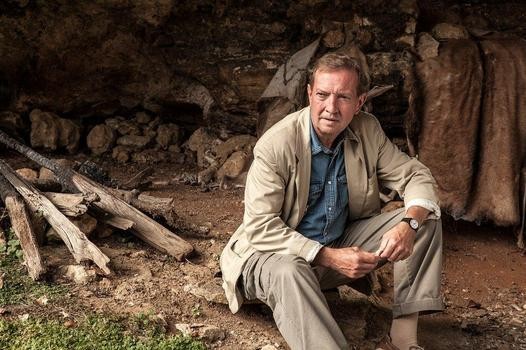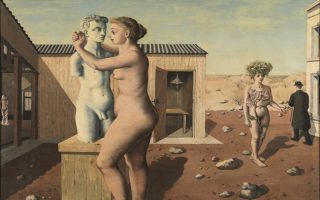An Interview with Martin Walker, author of “Bruno, Chief of Police”
Martin Walker, a journalist, novelist, and historian, divides his time between Washington D.C. and a village in the Périgord region of France. He has recently retired after six years as director of the Global Business Policy, a private think-tank for CEOs of major corporations based in Washington D.C. He is a senior scholar at the Woodrow Wilson International Center; a senior fellow of the World Policy Institute at the New School for Social Research in New York; a director of Global Panel, an international policy advisory board; and editor emeritus and columnist at United Press International (UPI).
Walker was educated at Oxford and Harvard universities, where he studied history, international relations, and economics. In his career as a journalist he spent 25 years with Britain’s The Guardian, serving as bureau chief in Moscow and the U.S. as well as European Editor. He has written for the New York Times, the Washington Post, the Times Literary Supplement, Foreign Policy, El Mundo, the Moscow Times, and many other publications; and has regularly broadcast on the BBC, National Public Radio in the U.S., and CNN. He is the author of several books of nonfiction, most recently The Makers of the American Century, and The Iraq War.
He is also the author of the much beloved, bestselling series of novels about Bruno Courrèges, “a peaceful, gentle fellow who likes to cook for his friends,” who is also the lone policeman in a fictional village in the Périgord region. The Bruno series has been widely acclaimed for its lush depiction of the pleasures of life in the Dordogne, the beauty of its landscapes, and l’art de vivre francais, as well as for its engaging mystery plots and its sometimes humorous, but always affectionate, depiction of village life.
Currently in the midst of a book tour through Germany, Mr. Walker graciously agreed to answer my questions from the road, via e-mail.
JH: You and your wife divide your time between Washington D.C., and a village in the Périgord region. How and when did you come to have a home in the Dordogne? And what do you love most about this part of France?
MW: We had some good French friends who bought a house in the region in the 1980s and we would regularly go to stay with them until my wife decided we should get a place of our own – another of her brilliant decisions. The Périgord has always enchanted me with its combination of food and wine, the people and the climate, the look of the buildings, the shape of the landscape and the feel of history. It lies at the heart of so many things. All our history is there, the 17,000-year old cave paintings of Lascaux and the medieval castles and the legends of the chevalier-troubadours like Bertrand de Borne, to the Resistance dramas of World War Two. I just had to write about it. It seemed when I first came to the Périgord – and still seems today – a beguiling mixture of the deeply familiar and the exotic.
JH: “The Patriarch” is the eighth in your series of novels about Bruno, the chief of police–and in fact the only law enforcement officer–in a quiet little village in the Périgord, much like the one you live in, I imagine. You’re a great storyteller, you write elegant prose, and you have created very sympathetic, engaging characters. But your career as a writer did not start, and indeed has not remained, as a novelist exclusively, or even primarily. How and why did you decide to start writing fiction? And what are its special joys and challenges?
MW: It was the combination of the caves and the Perigord itself. All my earlier books had been of history and politics, but something about this part of France loosened something in my head. The place enchanted and inspired me, and I wrote The Caves of Périgord. But then I still hadn’t satisfied this need to convey, if not capture, something of the magic of this place in words, so I began writing the Bruno books. Bruno himself was inspired by my own village policeman and tennis partner, Pierrot. Like Bruno, he is a charming and genial French army veteran, hunter, cook and rugby player. Unlike Bruno, he’s happily married with a grown son.
JH: I’ve just finished teaching a class in which we read and discussed the first novel in the series, “Bruno, Chief of Police.” To me, one of the most interesting things about this book is the way it weaves contemporary social issues and concerns–tensions in rural France over EU agricultural regulations; the difficulties associated with assimilating cultural, religious, and ethnic diversity into French life; the still smoldering legacies of past wars; the ever-present concern about the growth of extreme nationalism, etc.–into the plot. Right now the European Union is undergoing a period of enormous stress over what to do about some of these very difficult issues. Do you think the EU will be able to make it through this period intact? And what happens if it doesn’t?
MW: This is the best Europe we have ever known, free and democratic, prosperous and at peace, its citizens free to live and work almost anywhere on the continent. Sometimes it feels too good to be true – so, of course, it is. And with the euro in trouble, Putin on the borders, wars in the Middle East and hundreds of thousands of refugees risking their lives to come, Europeans are becoming nervous about the stability of this great experiment. My worry is that if our democratic institutions and parties cannot handle these challenges, in a few years we might find extremist parties applying their own solutions. But I hope we have learned that lesson. It is amazing to me how quickly people forget how much better things are today and focus instead on the negative. It’s like that scene in Monty Python when the Palestinian rebel says, “Apart from the roads, and the plumbing and the central heating and the law & order, what have the Romans ever done for us?”
JH: I also found interesting the complexity with which these issues were presented in “Bruno, Chief of Police.” Things are not so black and white, there are many shades of gray in the story as it unfolds, and a distinction is made between what is legal and what is just. You even say on your website that Bruno applies “his own sense of justice” in catching criminals. Do you want to elaborate a bit on what you mean by that?
MW: Sometimes, as in the first novel, his own sense of justice acquiesces in not bringing criminals to a court case that would be hopeless. In other novels, he decides to trust people that he should perhaps be arresting, or gives a criminal another chance, or makes an extra effort to keep a troubled kid out of jail. The law is made for humans, not the other way around, Bruno believes. Since he works for the mayor and council of St. Denis, they know the law can be an ass. Along with the whole village, they cheerfully help Bruno to flout the European Union rules on food hygiene to allow the local farmers to make cheese and foie gras just as their ancestors did.
JH: One of the most interesting chapters for me in the first Bruno book is the magnificent meal–which is described in exquisite, mouth-watering detail–that is prepared for Bruno by an Englishwoman, using all–or almost all–British ingredients. What was the inspiration, or the motivation, for writing this chapter? Did you think it was about time for all those stereotypes about English cooking to be challenged?
MW: Most of us eat two or three times a day and I’ve always been baffled that novels seldom reflect that simple fact. Food is hugely important and in the Périgord it is central to our lives. I enjoy cooking and am lucky enough to be married to a wonderful cook, the same Julia Watson who used to write for Gourmet magazine. We talk about food and wine a lot, enjoy experimenting and enjoy most foods. Every time I’m back in the U.S., I head for a good burger joint and wash it down with one of your amazing new craft ales. I’m proud of English and Scottish food and enjoy preparing it for my French friends, and teaching them that most of what was wrong with British food was because of wartime rationing. And I like to remind my German friends that while we never rationed bread in Britain during WW2, we did so in 1946 to feed the starving Germans.
JH: Do you want to tell us a little bit about “The Patriarch”, Bruno’s latest adventure? And of the eight books in the series, do you have a favorite one? Or is there one that was particularly fun to write?
MW: They are all fun to write and my favorite is always the latest or the one I’m working on right now. Patriarch has some echoes of my time in Moscow as The Guardian’s bureau chief in the 1980s, the time of Gorbachev’s reforms and Perestroika. I was invited to an event at the French Embassy, a reception for the pilots of the Normandie-Nieman squadron, Frenchmen who flew for the Soviet side in WW2. They became heroes in both France and the USSR, and my latest novel begins with a very grand 90th birthday party for one of them. And he has a boring and aging son in his sixties who is married to a very beautiful and politically ambitious woman in her late thirties. At the birthday party, somebody dies and everyone wants it to be ruled an accident. But Bruno has doubts.
JH: You’ve collected a lot of honors for your writing and reporting, but you have also been named a Chevalier du Foie Gras by the Confrerie du Paté de Périgord, a Grand Consul de la Vinee de Bergerac, and an honorary ambassador of Périgord. Can you tell us how you came to receive these honors, and what they mean?
MW: One of the Bruno novels, The Crowded Grave, has a lot about foie gras, so I was invited to join the Confrerie, which is the body that each year judges and awards the prize for the best foie gras, duck and goose. When I was nominated for the group, I had to swear a public oath to uphold the quality and reputation of foie gras in the old market square of Périgueux, and I was then sworn in and baptised with a duck, and then draped in medieval robes. The Consulate of Bergerac wines dates back to 1232 AD, 260 years before Columbus landed in the New World, and we are sworn to uphold the reputation and quality of the wines of Bergerac. I was brought in because I write a lot about wine in my books and because I try to help promote Bergerac wine, which has the best quality to price ratio of any wine in France, but is very little known outside the country. I want to help change that, and next year we will launch a Cuvée Bruno red wine.
JH: You and your wife have collaborated on creating a cookbook of Bruno’s recipes, which was published in German last year. That book was named “World’s Best Book on French Cuisine” in an international competition, wasn’t it? Will it be published in English, and in French? And if so, when?
MW: Negotiations are under way on the English-language version, which has been delayed over the cost of photo rights. If the French publishers ever relax enough to accept that a Brit of Scots origin can write a decent book on French cuisine (and a chapter on wine) than we might get a French version. It is very strange to look at copies of our cookbook, which now bear the sticker “Best in the World.”
JH: What’s next? Will we see more of Bruno? And if so–I know many of your readers will want to know this–will this eminently attractive bachelor ever find the woman of his dreams and settle down?
MW: There will certainly be more Bruno novels. The next in the series, number 9, is already written and will be published next year under the title The Fatal Pursuit. The tenth novel is being written now, and I have ideas for several more. On Bruno’s love life, I don’t know; Bruno hasn’t told me yet. He wants to settle down and have a family but he keeps falling for strong, independent-minded women who are happy to have a fling with Bruno but prefer to lead their own lives and pursue their own careers.
Janet Hulstrand is a freelance writer, editor and teacher based in the Washington D.C. area. She writes frequently on France for a variety of publications, including her blog, Writing from the Heart, Reading for the Road. Each summer she teaches “Paris: A Literary Adventure” for the education abroad program at Queens College of the City University of New York. She also teaches literature classes at Politics & Prose bookstore in Washington D.C., and Writing from the Heart workshop/retreats in Essoyes, a beautiful little village in the Champagne region (l’Aube).
Share to: Facebook Twitter LinkedIn Email
Leave a reply
Your email address will not be published. Required fields are marked *






REPLY
REPLY